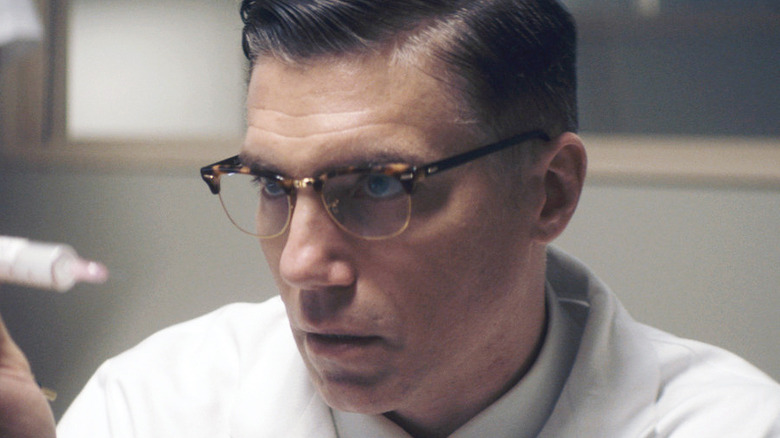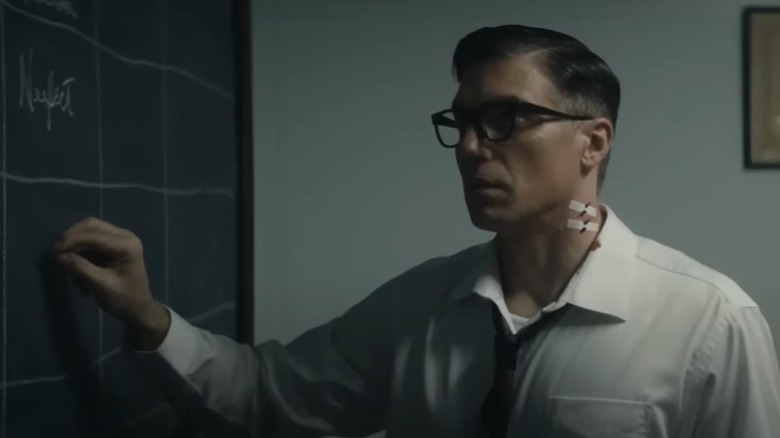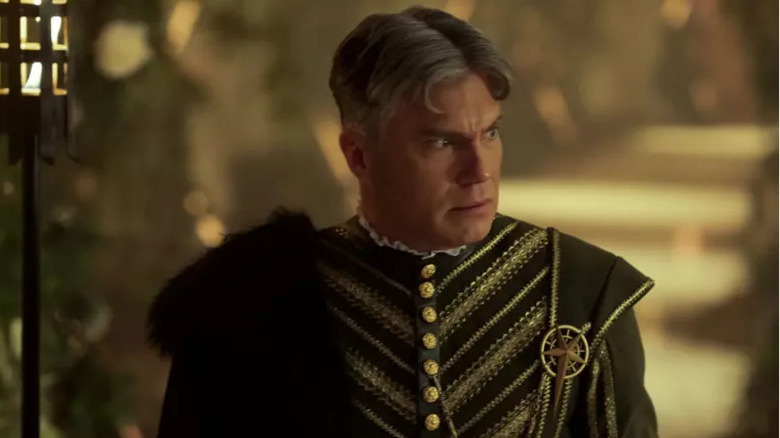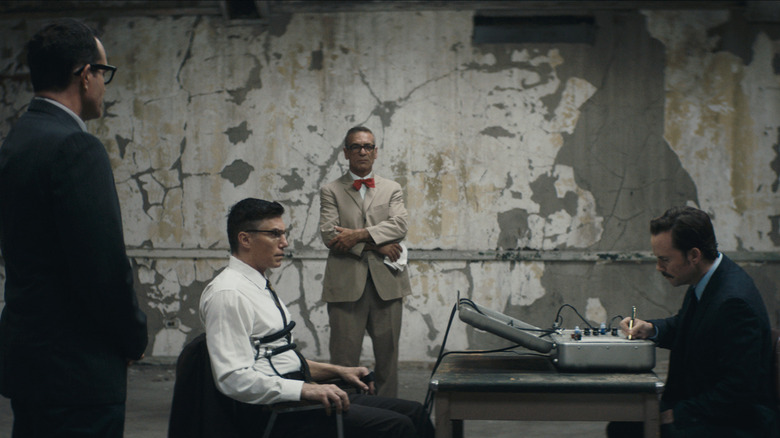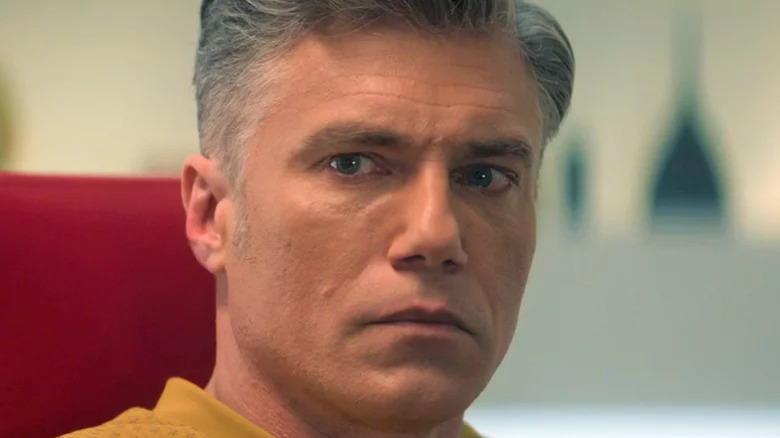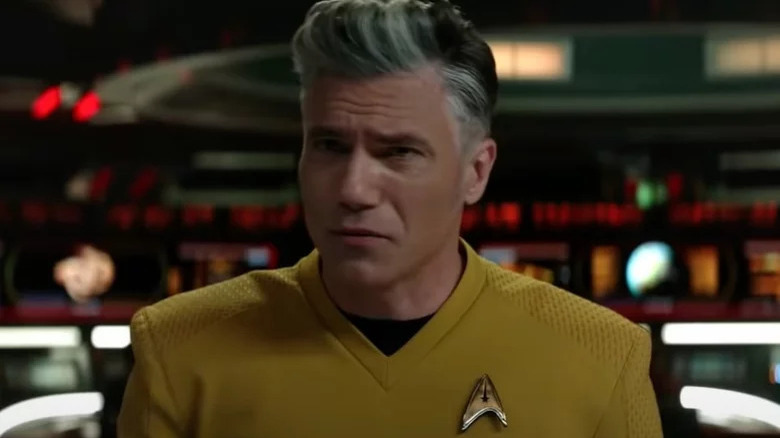Anson Mount On Challenging Unethical Conspiracies Against All Odds In MK Ultra - Exclusive Interview
Project MK-Ultra, a human experimentation program run by the CIA, is one of the darker moments in U.S. history. The project was a clandestine operation that used a variety of methods — some of which involved drugs — against unwitting U.S. and Canadian citizens in an effort to develop mind-altering substances that would assist interrogations. The unfortunate project lasted roughly 20 years, from its founding in 1953 to its cessation in 1973.
In a new thriller written and directed by ex-intelligence officer Joseph Sorrentino, Anson Mount plays psychiatrist Dr. Ford Strauss, a well-meaning doctor who gets involved with the CIA project and who discovers its ethical transgressions and terrible consequences firsthand. We spoke with Anson Mount about the film, working with an actual ex-intelligence officer in Joseph Sorrentino, the program's real-life shady history, and of course, a little bit about the second season of a "Star Trek" show he happens to star in.
A character making a devil's bargain
This program was such a dark moment in history. Why join "MK Ultra"?
A lot of reasons. Initially what grabbed me was the script, and it was clearly well-written and smartly written. It wasn't just great dialogue and great characters and all that, but the writer understood the importance of how much information you provide an audience, and more importantly, how much information you don't provide an audience, to keep them leaning forward in their seats. Then, when I met with Joe [Sorrentino], I found out his background in intelligence, so that sense of authority I read in the script made a lot of sense.
Also, as you said, it's a piece of our history that hasn't fully been told, because where do you even start? It's a conspiracy; it's a cover-up. It was a really smart way of looking at the moral implications of that without getting bogged down into "Is this a fact or not?" [or] the minutiae of "What can we be sure of?" It's a movie about not being sure of anything. It's a stranger in a strange land.
Also, the intelligence in the writing is the setup, in that Joe put every single thing in place that could cause this tailspin to keep going in a widening gyre. The character is an intellectual animal who, through his own actions, ends up in a place where logic has no purchase. Everything he knows that's worked suddenly stops working, and he is an alien in this world to begin with. It was a juicy script.
Your character, Ford Strauss, means well but makes a devil's bargain that goes further than he even knew. Tell me about Strauss' journey from your perspective.
It is a devil's bargain. That idea of striking a deal with the devil has always struck me as ... I don't know if it's ironic or it's funny — maybe both — that anybody would assume the devil to deal straight with you. There's something I've always been fascinated by. In fiction and nonfiction, [I love] stories about the structure underlying what we think is the structure [of things] that's really the stuff of conspiracy theories as well, [and] this idea that what you see on the surface of things is not reality — that there's a deeper structure that is actually running stuff.
There are some of the crazier [theories] that [are like] "There's a microchip in everybody's brain." It can go as far as that, but these things don't come out of nowhere ... at least, in the United States, because we do have a not-so-squeaky-clean history of real conspiracies, of acting like the proverbial machine that does not care about its cogs, and our federal government's sometimes blindness to the individual. I don't think it's any mistake that conspiracy theories tend to arise in empires and in largely healthy societies, at least societies that we perceive of as successful in health.
Paramount's ready for Trek to do crazy things
As Joseph Sorrentino wrote and directed this, and as you mentioned, he has a background in intelligence. What was working with him like, and did it affect your preparation?
Out of my own curiosity, I remember picking his brain about his previous career and his opinions on things going on in the world. But for playing Ford, I didn't want to have a lot of insight. I would be interested to hear if there were different conversations between Joe and Jason Patric. That would be an interesting question.
While I have time with you, I have a "Star Trek: Strange New Worlds" question. Showrunner Henry Alonso Myers said in interviews that he's holding nothing back in Season 2. How has that affected the show?
We're swinging for the fences with every season on the show, and that's the right way to go. We took a lot of risks with Season 1 in terms of the size of the show, in terms of genre switching, in terms of trying to establish or reestablish the Gorn as a major threat, and to [play] with what "Star Trek" can be.
If you think about the storybook episode, if you think that we took big risks in Season 1, wait until you see Season 2, man. When you're getting ready for Season 1, you're still trying to convince the network that you know what you're doing, and you send them some crazy stuff and they go, "You're ... wait, what?" To Paramount's credit, we got a lot of faith and trust from them, but I did hear through the grapevine there were some calming conversations that needed to happen. Now we have their full trust. They're ready for us to do the craziest s*** we want to, so we're taking advantage of that.
Stories about a character caught in the machine are always relevant
In any other show, if you're like, "There's a sentient space cloud that makes the storybook real," any other show would be like, "That's bonkers," but in "Trek" it's like, "Oh, nice. Okay."
When you think about a show that is trying to do a classic "Trek" show, those occasional bonkers episodes are classic "Trek." If you think back to some of the stuff that they did, especially in "[Star Trek]: The Next Generation" in the Holodeck, some of those episodes they would do in the Holodeck were ... The Robin Hood episode? [laughs]
I loved the gangster episode, too — so out there.
In the original, the gangster [one], they go to a planet that's in the 1930s. It's like, "All right, sure."
I love that ethos. To swing back to MK Ultra, the film is poignant for its highlighting of abhorrent actions the government's taken. Do you think the film is relevant today?
I don't know if it is. I don't think about storytelling in those terms, in terms of relevance. When you're producing and you go in to pitch a show or a movie, the executives' favorite question is "Why now?" I hate that question, because I'm like, "Because it's a good f***ing script! That's why." [laughs] And if you print that, make sure that I said it while I was laughing. I don't want executives to think I'm an ***hole!
But a story about the little guy caught up in the machine is always going to be relevant. There's a big reason that we listen to a story around a campfire — or we go to a movie theater, which is essentially the same thing — which is to think to ourselves, "What if that were me?" That's why the movie is successful in telling the story, because it doesn't fall into the trapdoor of trying to get caught up in the facts and figures, and what's real and what's not real, about what actually happened. It's a very microcosmic, individual story about the implications of the ethics surrounding something that happened in our culture.
Comedy happens in the moment
In Season 2 of "[Star Trek]: Strange New Worlds," there's going to be a crossover collaboration with "[Star Trek]: Lower Decks." Tell me about working with Jack Quaid and Tawny Newsome.
You've got to be on your toes with those two. If there's one thing that our show's doing well, when we venture into comedy, our creators and our directors are very aware that comedy is something that happens in the moment. You have to be a little loose. You have to be finding the twist or the turn or the ... I'm not going to say "punchline" because that's not it, because that's an act of hard writing. But [in] the scene, you have to find those moments in the moment that you're doing it, so they've given us a lot of freedom, and those guys took full advantage of it.
To do this episode with Jonathan Frakes, who has one of the best senses of humor of anyone I know, we had a blast. We had a really, really good time, and I loved getting to know those two. Tawny is an encyclopedia of "Star Trek," and Jack is an impressive young man. Both of them are going to have tremendous careers.
How does it feel to be part of all those moments and characters that are so pivotal to "Trek" history, and for your character story to intersect so deeply with fan-favorite characters?
It's the longest that a job has remained surreal to me. Literally every single day, I'm stunned by the fact that I'm not only on "Star Trek," but I'm the captain of the Enterprise. It's crazy to me because I was an early "Trek" fan, a young "Trek" fan, and it was my make-believe game as a kid. To be able to fill out a piece of history in the canon that everybody is so curious about, of all of the minor characters in "Trek" canon ... I don't know why — I'm not sure anybody knows why — Captain Pike has that special place [or] why people are so curious about him. Maybe because he's Roddenberry's original vision of what the Starfleet Captain should be — maybe that has something to do with it.
The tragedy of losing Jeffrey Hunter so young probably plays into it as well, but [playing the role] is one of the things I'm most grateful for in my career so far. It does come with a tremendous sense of responsibility and mischief, and I hope we get to tell the whole thing. We know one side of that story from the menagerie; maybe there's another angle on it we haven't thought of yet. It would be nice to get to that, but that's not for many years to come, hopefully.
Prepare for a fun Season 2 of Strange New Worlds
In Season 2, is there any moment you can talk about that we should look out for that's a particular favorite for you?
Yes, but I can't talk about it. There are a few. It's a really fun season.
I'm looking forward to it! If you could talk about it, what would you say? I'm just kidding.
[laughs] I know, believe me — I wish I could, but so much of what we do ... I don't know what your relationship is to Christmas, or birthday presents and all that. For me, there's something — and I think most actors share this — I get even more excited than the person whose birthday it is to give the present, to see their eyes when they open that present that is the one that they want. It is the exact same feeling when you're backstage before curtain, and you take a peek out to the audience when you're about to do a show you know is good. It's that same feeling. But part of it is the wrapping, and you have to respect the wrapping, and you have to respect the curtain. I wish I could say more, and eventually, we will. You know how these things work; we eventually start dribbling pieces of information.
"MK Ultra" is available in select theaters and on VOD.
This interview was edited for clarity.
